
|   |

|   |
Fourth Brahmaputra Classical Dance Festival - Dr.Nita Vidyarthi e-mail: nitavidyarthi@gmail.com Photos: Manasdas Photography August 14, 2022 The fourth Brahmaputra Classical Dance Festival was organized recently at the Triguna Sen Auditorium, Kolkata, by Manjary Dance Academy, a Guwahati based institution, teaching, promoting and propagating Sattriya, the classical dance of Assam, side by side with training in Bharatanatyam under the guidance of its founder Tatini Das. A seasoned Bharatanatyam dancer in her own right, Tatini intends to showcase North East’s very own classical dance tradition Sattriya to a wider audience across the country and so she has started this floating festival. Sattriya dance style is gradually gaining popularity, thanks to a reasonable number of young dancers guided by some stalwarts, acclaimed and seasoned dancers and a few organizers like Tatini. It is yet to move shoulder in shoulder with other classical dance forms outside Assam but days are not far. There are some problems regarding the principal aspect and spirit of Sattriya dance presentations as the teaching and philosophy of Sattriya culture are being overlooked by some performers. It is the second time in Kolkata this year that Tatini, after a lot of hard work has brought the festival here. This time it saw several seasoned Sattriya artistes from Assam along with a few other forms as well. 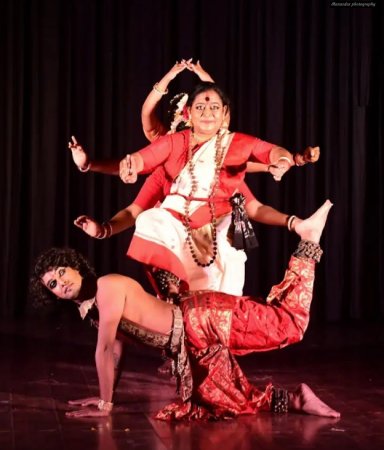 Mahua Mukherjee and group The evening opened with a presentation of Gaudiya Nritya, Bengal’s own dance form entitled “Narteshvara Vandana” or invocation to Nataraja by Dr. Mahua Mukherjee and her group of Gaudiya Nritya Bharati, Kolkata. An accomplished dancer, distinguished scholar and teacher and pioneer in reviving the almost extinct form - claimed to be the classical dance of Bengal - Mahua, a Fulbrighter, has taken Gaudiya Nritya around the globe by performing, teaching and presenting the dance form as a visiting professor. She has been toiling hard for about 40 years along with her singer husband Amitava Mukherjee to establish the status of the lost dance form that was popularised in 1995 by scholar Prof Bratindranath Mukherjee, her mentor. With the reverberation of “Namoh, Namoh,” Mahua, along with her group began with a stunning frieze of Lord Nataraja for the Vandana based on a popular song “Nrityere taaley taaley hey Nataraj” composed by Rabindranath Tagore and gradually unfurled into the movements. The song was interspersed with pure dance numbers with bols in Gaudiya taal Dashpahari (8 beats) and later in Jhaptaal (10), choreographed by Mahua with music direction and vocals by Amitava Mukherjee. The skilled and well-trained dancers, all seniors, were her son Ayan Mukherjee, Soumya Bhowmick, Manikiran Duttagupta, Sayantika Majumdar and Saheli Pal. Good team work and group dynamics made for viewing pleasure. 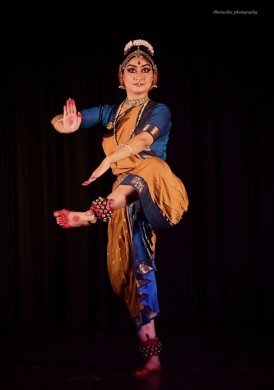 Mandakranta Roy In the Bharatanatyam segment was Mandakranta Roy, a disciple of Guru C.V. Chandrasekhar, who presented the well-known Tulsidas bhajan “Gaiye Ganapati” set to raga Kalavati, with passion and understanding. It was choreographed by her Guru who composed its music for the first time in the Hindustani raga. 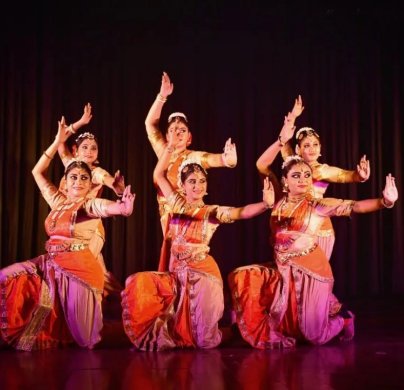 Manjary Dance Academy 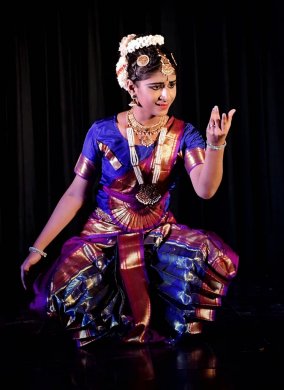 Oindrilla Das The Manjary Dance Academy group proved their training in rhythm and team work in the Revathi Tillana but the show stealer was young Oindrilla Das. Trained by her mother Tatini, the energetic dancer was at her technical best with unerring rhythmic control, vocabulary and elaborations in “Sankara Sri giri” composed by Madurai Krishnan and choreographed by Vaibhav Arekar. Her sharp teermanams revealed all the potentials of a good dancer. Here is a dancer to watch! 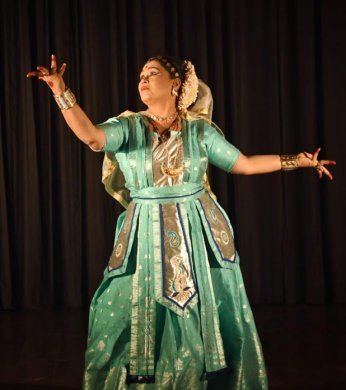 Pratibha Sharma 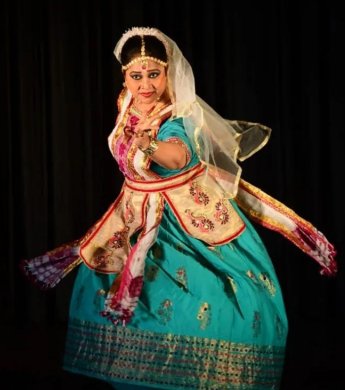 Dreamly Gogoi The Sattriya recitals brought in fine quality performances by skilled and confident dancers both in solos and in duets. A consummate, well-known senior dancer Dr. Pratibha Sharma began with a sublime and subtle Krishna Vandana with a devotional flavour, loaded with sophisticated movements followed by the standard form of Rajagharia Chali Nach with undiluted grammar of the lasya dance form based on suta taal. The music was by Bhaskar Jyoti Oja. This was followed by “Bhongi Porokash”, a duet with Dreamly Gogoi displaying graceful bhangis. Based on a Guru Bhatima (panegyric hymn) composed by Kusha Mahanta and different bols (adorned with pure dance numbers) of Sattriya nach on suta taal choreographed by Pratibha Sharma and Dreamly Gogoi, the number was impressive for the amplified and crisp movements with fine coordination among the dancers, so essential for a successful duet. Dreamly Gogoi charmed with an engaging abhinaya on ‘Barpeta naam prasanga’ style on teentaal and a Chali Sokor Nach and Mela Nach in porital and ektaal respectively. 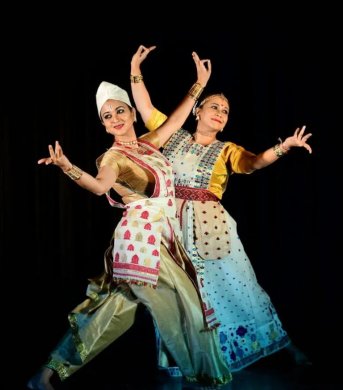 Prerona Bhuyan and Madhusmita Bora With deep understanding and intense passion, Prerona Bhuyan and Madhusmita Bora presented the duet “Ram Bondana - Ram Katha” composed by Guru Jatin Goswami and Anita Sharma in ektaal and sutkala set to the sweet raag Sree, by the late Murari Mohan Sharma. Ram Katha derives its text from the “Bhatima” or invocation of the Ankiya Nat “Ram Bijoy” written by Saint Sankaradeva and the episodes depicted were Sita Swayamvar, the building of Ram Setu, Parasuram’s defeat in the hands of Ram and killing of Ravana. The theatrical elements were portrayed with dramatic imagery by the skilled and confident dancers, offering some memorable moments of fine choreography. An enjoyable presentation by all means. 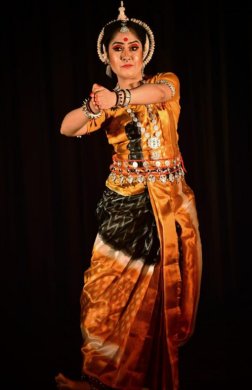 Debdutta Lahiri Sole Odissi dancer Debdutta Lahiri could not rise above mediocrity with her performance of Jayadeva’s ashtapadi “Sritakamala kuchamandala”. Tatini Das’ effort of presenting the Sattriya culture to the city is definitely praiseworthy. 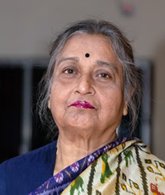 Dr. Nita Vidyarthi is a veteran critic of performing arts and writes on dance, music and theatre in leading publications. |